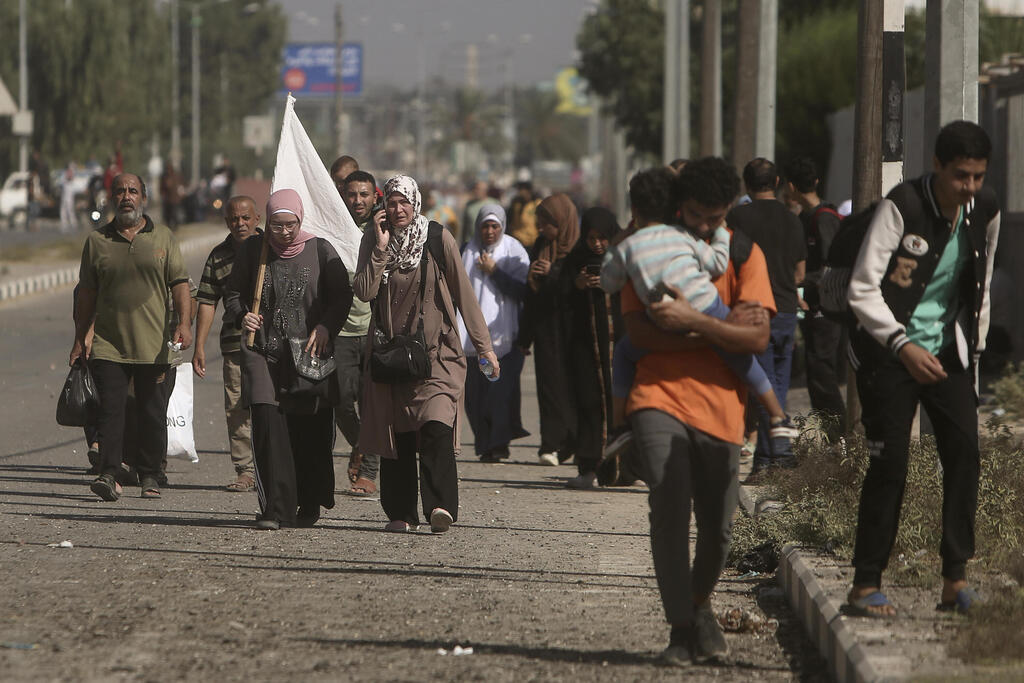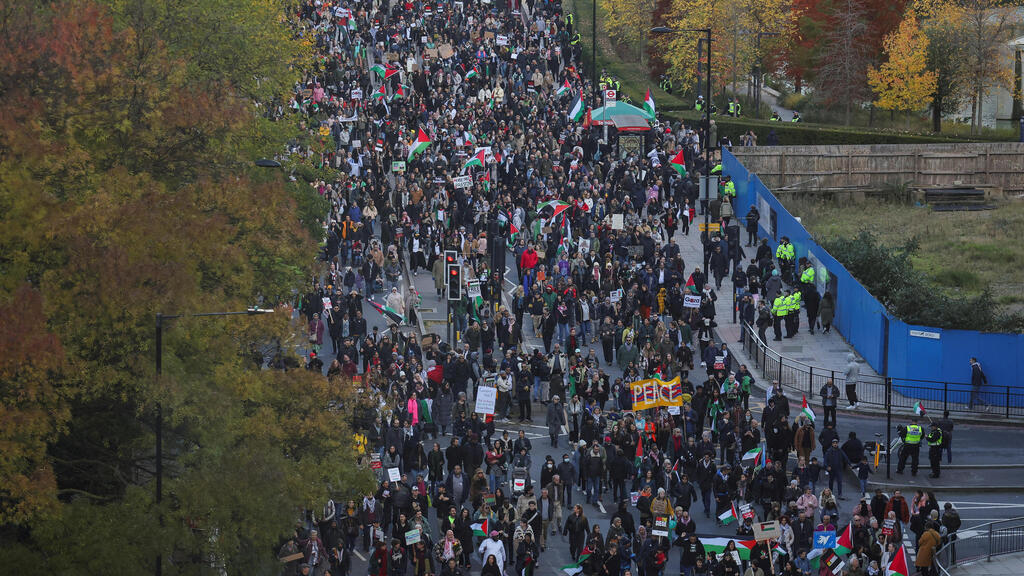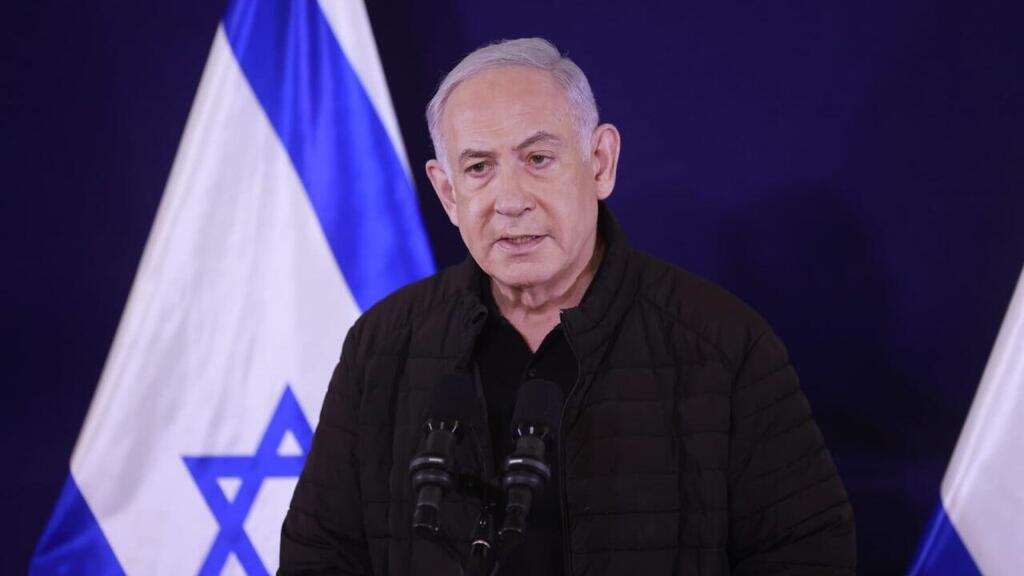Despite receiving news on Saturday about additional casualties among the IDF forces during ground operations in the Gaza Strip, it must be said that what began as Israel's greatest military failure is turning into a relatively successful military operation that instills considerable confidence in the military and Shin Bet’s ability to deal Hamas a heavy blow.
More stories:
However, at the same time, it’s impossible to ignore what is increasingly becoming one of the greatest political nightmares we’ve known. Especially after such a murderous massacre of Israeli civilians, and after all the horrifying acts documented by the terrorists themselves, the majority of the world sees us, the Israelis, as terrorists, while Yahya Sinwar and his comrades leading Hamas are seen as freedom fighters receiving praise worldwide, including in the American and British public opinion and, naturally, in Arab countries.
The severe trust crisis among many Israeli citizens regarding the military's ability to function following the war’s first 24 has turned into an understanding that there those we can trust and allow Israel to execute a successful ground maneuver.
In the days preceding the ground incursion, there were numerous voices against any action by ground forces within the Strip. It seems that the fear of a second ground operation akin to that taken in the Second Lebanon War, costing significant casualties and earning few military or diplomatic achievements, led to many voices from both right and left calling to avoid such a move.
However, the current ground offensive in Gaza specifically justifies itself: the IDF and the Shin Bet are achieving significant successes on the battlefield, the most significant among them being the successive fall of Hamas's symbols of power.
Forces are closing in on the hospitals in Gaza City’s center, the quarter containing Hamas’ politburo offices is already under partial Israeli control, and effectively, the IDF has managed to defeat the Hamas battalions that attempted to hinder the entrance into the northern part of the Strip.
At least one of the main goals of this war, the removal of Hamas’ rule, is already within reach. In fact, one could now possibly talk about Hamas’ rule in the past tense. The organization no longer controls the Strip, and the best evidence of this is the immense flow of refugees leaving the northern part of Gaza and heading south, contrary to the organization’s desire for them to remain in their homes.
Hamas government offices aren’t operational, and the terror organization's leadership is hiding in tunnels and bunkers under the Strip. It's difficult to predict when they’ll see daylight again.
This success is not coincidental. It’s the result of determined and aggressive military action, with the use of firepower that Gaza has never witnessed before, along with effective tactical intelligence. Yes, the same intelligence that failed on the first day of the war.
The troops entering the Strip had information on how Hamas forces were spread out and about the tactical traps the terror organization was preparing for the soldiers: tunnels, explosives, anti-tank missiles, and more.
Commanders operating in these sectors were even equipped with a small handbook containing information obtained from interrogations of Hamas detainees by the Shin Bet. The elimination of Hamas battalions and division commanders also weakened the enemy's resistance capability. Even the descent into what's called Gaza’s "subterranean" level didn’t save terrorists from being targeted.
Above all of this stand the dramatic images of the Gazan civilians heading to safety: Hundreds of thousands of Palestinians fleeing their homes, despite Hamas' disapproval, carrying white flags, acknowledging that they can't rely on the terror organization’s leadership.
5 View gallery


Palestinian civilians leaving for southern Gaza lifting white flag
(Photo: AP Photo/Mohammed Dahman)
This is accompanied, of course, by numerous accusations of Israeli crimes, but also by criticism of Hamas leaders abandoning the population—hiding in bunkers while the people pay the heavy prices.
After all this, it needs to be noted that the senior command of Hamas’ military wing is still operational and likely still able to communicate with some of its forces on the ground. The organization still has some rocket fire capability, albeit reduced, and Hamas isn’t rushing to surrender or even negotiate a prisoner exchange deal.
Things should be made clear: The blow to Hamas' military ranks doesn’t bring the political success required for such a war. Yahya Sinwar, who successfully incited mixed cities in Israel in May 2021, is now accomplishing what no previous Arab leader has: he's become a hero for the masses in Europe and even in the U.S.
He's evoking unprecedented support for a murderous terror organization that operates in methods reminiscent to those of ISIS. While in the first two or three days of the war, nearly the entire world stood by Israel’s side, on Saturday, nearly half a million people demonstrated in London against Israel and in favor of Hamas.
Streets in Washington and New York are filled with pro-Palestinian protesters, and every John Doe in Europe has learned to chant "Free Palestine" without knowing where Gaza is even located on the world map.
Also on Saturday, Arab and Muslim leaders gathered for a summit in Saudi Arabia, calling for an immediate cease-fire in Gaza, and one after the other, attacked Israel. Turkey and Qatar, alongside the Palestinian Authority, as well as our allies Egypt and Jordan, the very two who were so heavily threatened by the Muslim Brotherhood, are now expressing support for a cease-fire that will help the Brotherhood in Gaza, namely Hamas.
French President Emmanuel Macron also joined calls for an immediate cease-fire in the Strip, even though he initially supported Israeli steps in the war against Hamas.
Yes, the global public trend is linked to blatant antisemitic trends, but it's also connected to how Prime Minister Benjamin Netanyahu's governments have managed to depict Israel as an unruly bully unwilling to accept any diplomatic deal with the Palestinians. Or, in other words, a peace rejectionist.
Even Hezbollah leader Hassan Nasrallah understood where the global trend is heading, refraining from assurances about joining Hamas' war, while calling for increased pressure on the West. He already realizes that it’s precisely the public opinion in Europe and the U.S. that might ultimately lead to a fast-approaching cease-fire.
Netanyahu's supporters will surely argue that any Israeli government would likely face a similar attitude from the world in the case of an operation inside Gaza. And, in the interest of fairness, it must be said that we might have encountered certain manifestations of hatred even if a different government were in power in Israel.
However, the diplomatic failure and lack of public diplomacy we’re seeing isn't solely due to antisemitism but also arises from the feeling in many countries around the world that Israel lacks leadership seeking something beyond expanding Jewish settlements in the West Bank.
As Tom Friedman said in The New York Times last week, Israel urgently needs international legitimacy. U.S. President Joe Biden stood by Israel, Friedman wrote, but in order to gain significant international support, Israel needs to take a diplomatic initiative that addresses the Palestinians in Gaza, and help in finding a solution for the day when Hamas won’t rule the Strip.
However, Friedman, who defined Netanyahu as the "worst leader in its [Israel’s] history,” wrote that it's doubtful whether Netanyahu can or wants to take such an initiative. His longstanding policy of declaring a political war on the Democratic Party in the U.S., his absolute refusal to engage in any dialogue with the Palestinians, and his focus on his own base have led to the current diplomatic cost we’re paying, along with the unbelievable scenes of crowds across the U.S. protesting against Israel, waving Palestinian flags, and tearing off posters showing Israeli captives.
 Avi IssacharoffPhoto: Gabriel Bahariya
Avi IssacharoffPhoto: Gabriel BahariyaWhat's happening in recent days is one of the biggest political and public diplomacy failures Israel has ever known, maybe even the biggest considering the way in which the war started. Unlike the military failure - there's only one person to blame for this, and that's Prime Minister Netanyahu. Hamas probably won't be in control of Gaza once again. But when talking about the day after that, Netanyahu is part of the problem, not a part of the solution.
- Avi Issacharoff is a political analyst for Ynet and Yedioth Ahronoth







